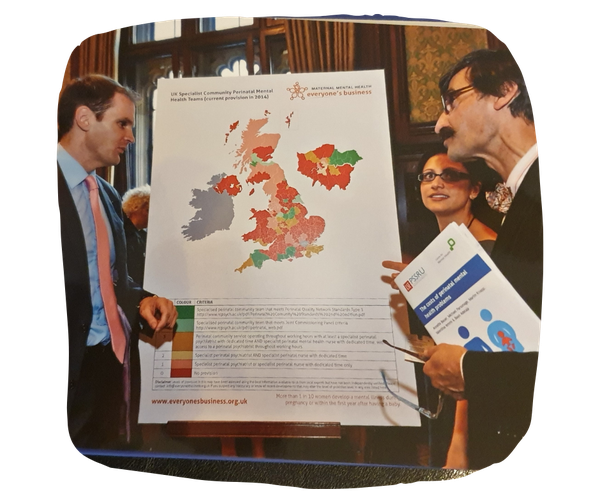In 2012, Sir Charles Walker KBE MP announced in the House of Commons that he has OCD. As a constituent, I approached Sir Walker’s office and was advised not to attend a surgery meeting and instead have a dedicated one to one meeting.
Sir Walker requested I compose a one-page summary of the current services situation for perinatal OCD.
I found this a challenge to distil such complexity and need into one page, but after quite a few drafts I got there!
The one-pager was used to arrange a meeting with Dr Dan Poulter MP, Parliamentary Under Secretary of State at the Department of Health. This felt like a huge responsibility to carry, and I wanted to make the best of the meeting – so the preparation included a summary of the current landscape, what should be in place and examples of how to get there.

As a result of this meeting, I was filmed to share my perinatal OCD recovery highlighting where funding must be focused to support women and families.
This film was published on the Department of Health website:
The film was then used as part of the Institute of Health Visiting training programme, Royal College of Psychiatrists training and GP perinatal mental health training programmes as well as across specialist perinatal mental health teams. This resource has been used over and over and has been well received.
It took an enormous amount of time to prepare because I wanted to make sure that when my children watched it, it would land as well as it could - this was just as important to me as the messaging for decision makers.
I then joined Healthwatch Hertfordshire and was able to influence their strategy and perinatal mental health became one of their priorities for the year. This meant I had to speak up at meetings to spotlight need regardless of the number of times I had shared before.
These activities resulted in meeting with commissioners to continue to campaign for equitable perinatal mental health services. Speaking directly with commissioners meant I could speak to the nuanced needs of women and families impacted by perinatal OCD and demonstrate that with the right help recovery is possible.
I maintained visibility through becoming part of the Hertfordshire Partnership University Foundation Trust enabling me to be part of consultations and showcase the difference perinatal mental health services can make for women and families.
I was also part of the NICE Antenatal and Postnatal Mental Health Guideline Development Group which meant I was involved in the process of writing the guidelines.
I was there to ensure the voice of lived experience was being heard throughout. This was sometimes challenging, being a lone voice of personal experience in a room full of clinical expertise but it was a vital part of the jigsaw.
Work continues to raise the profile and demonstrate need via a charity I co-founded, Maternal OCD. We provide insights and training to healthcare professionals and support pioneering perinatal OCD research to support future generations.
The road ahead is still long but it now has some clear directions, and I am confident we will all arrive at the right destination – where women and families are supported throughout their recovery journey.
Back to the AMV toolkit: making connections